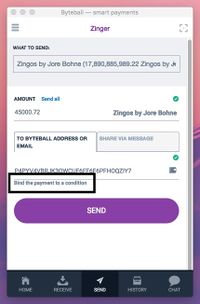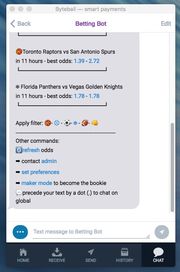Overview
Obyte features in-wallet: sports betting bots, payments to emails, encrypted text chat, altcoin exchange, your own custom tokens, your smart contracts.
Formerly Byteball, Obyte is a DAG-based cryptocurrency developed by Anton Churyumov.
Contents
Features
Smart/conditional payments
The killer feature is the Smart/Conditional Payment. You set a condition for how the payee receives the money. If the condition is not met, you get your money back. This substitutes for trust between strangers because neither is able to scam the other.
This smart-contract feature has many real-world peer-to-peer applications, including:
- no-fee crypto exchanges
- sports betting
- selling or buying insurance concerning negative events like a flight delay.
Textcoin
One can send Bytes (Obyte funds) by email or WhatsApp etc, even if the recipient is not in Obyte yet. For email, the sender just writes an email address where he would normally write a Obyte address. When he hits "Send", his email app is opened with pre-filled text for the recipient. The sender can edit the textcoin text before sending. The recipient receives an email with a link. Example:
Here is your link to receive 0.001 GB: https://obyte.org/openapp.html#textcoin?pact-volume-lazy-midnight-mix-cool-fiction-symbol-tag-fiction-coral-sibling
Identity verification for cryptos
Starting 18 January 2018, every Obyte user can link his Obyte address to his real world identity. The user’s personal data is verified by Jumio, the leading provider of identity verification services, and stored in the user’s Obyte wallet. At the same time, a hash of the personal data is stored on the public DAG and signed by a trusted attestor. The attestor also serves as a witness, so it is already trusted.
This attestation allows the user to prove to anybody that his Obyte address is linked to a verified person, without disclosing any personal information. It also allows to reveal the private information to individual service providers on demand, and the service provider can easily verify authenticity of this information using the hash stored on the public DAG.[1]
Sending payments directly to email addresses
When you have attested an email address using the Email attestation bot, anyone can make payments to you from their wallet using only that email address. The platform will automatically replace it with the attested [Obyte] address.[2]
Note that if you have several email addresses you can link each one to separate single-address wallets you create in your main wallet. This is all independent of the identity verification procedure above.
Blackbytes
Private payments can be made using blackbytes, a cash-like untraceable currency. Its transactions are not visible on the public database that shows all payments made with (white)bytes. Blackbytes are sent peer-to-peer instead in an encrypted chat session.
Chatbots
Chatbots are fun and facilitate real-world transactions. There are over 20 bots, including oracles, betting bots, exchange bots for blackbytes and other cryptos, games and ICOs (both for facilitating ICOs and actual ICOs).
Current chatbots are: Real name attestation bot, Email attestation bot, Flight delay insurance, Byte-BTC exchange, Flight delays oracle, Sports oracle, BTC oracle, Rosie bot, Byteball Asset Manager, Zork | game, Poll bot, Blackbyte Exchange [freebe] (Semi-trustless^), Buy blackbytes (trustless), Slice&Dice MUD, Betting bot (Semi-trustless), Luckybytes Lottery (provably fair), TitanCoin ICO, Byteball-Altcoin Exchange Bot, Fun-coins faucet, SilentNotary ICO, Worldopoly ICO.
^Ideally, crypto transactions are trustless, i.e., neither the sender nor the receiver need trust the other. The more trustful the situation is, the less ideal.
Platform
Obyte has its native currencies, Bytes and Blackbytes. It is also a platform for new assets (coins or tokens) you can create yourself at minimal cost in five minutes. You can simply send your asset to anyone with a Obyte wallet, or you can use your asset in many smart contracts.[3]
Some examples:
- Fun-coins: You can get millions of Tingos, Tangos, Zingos and Zangos from the free faucet in the Bot Store. The idea is use them to practise with textcoins, smart contracts etc without worrying if you lose them somehow.
- TitanCoin ICO: Independent ICO, where coins can be bought via the bot paying with GB, BTC, or Ethereum.
- SilentNotary ICO: Independent ICO, where coins can be bought via the bot paying with GB, BTC, or Ethereum.
- Worldopoly ICO: Independent ICO, where coins can be bought via the bot paying with GB, BTC, or Ethereum.
Basic info
Native currencies
- Bytes: Total supply = 10^15 bytes. Unit on exchanges is the GBYTE. 1 GB = 1,000 MB = 1,000,000 KB = 1,000,000,000 Bytes.
- Blackbytes: Total supply = 2.1111 x 10^15. 1 GBB = 1,000 MBB = 1,000,000 KBB = 1,000,000,000 Blackbytes.
All Bytes and Blackbytes were created at the genesis and 2nd unit. So far approx 69% have been issued for use.
Date introduced
- First announced 5 September 2016.[4]
- Platform went live on 25 December 2016.
DAG
Obyte data is stored and ordered using a directed acyclic graph [5] rather than a blockchain. This allows all users to secure each other's data by referencing earlier data units created by other users, and also removes scalability limits common to blockchains such as the blocksize issue.
There are no blocks: there are only transactions. You just add your transaction to the end of the DAG yourself, without waiting for the miners to (hopefully) include it in some future block.
The Obyte DAG is about 35 GB in March 2019.
Zurich presentation
A presentation given by Tony on 2 February 2018, that gives an excellent overview of Obyte.[6]
Videos
External links
- Main website
- White paper
- Transactions explorer
- Medium articles
- Bitcointalk thread
- Byteball Asset Manager (for you to create your own coin on the Obyte platform)
- Byteball Wiki
- Community Subreddit
- Community Slack
References
- ↑ https://medium.com/byteball/bringing-identity-to-crypto-b35964feee8e
- ↑ https://medium.com/byteball/distribution-to-verified-emails-and-sending-cryptocurrency-to-email-episode-ii-cb955fe19d7e
- ↑ https://wiki.obyte.org/asset
- ↑ https://bitcointalk.org/index.php?topic=1608859.msg16156239#msg16156239
- ↑ https://en.wikipedia.org/wiki/Directed_acyclic_graph
- ↑ https://docs.google.com/presentation/d/1dpbE1l4Aj8Te2_i9wjVsW48igZMhdyjKJVcWY-45qd8/edit#slide=id.p5

